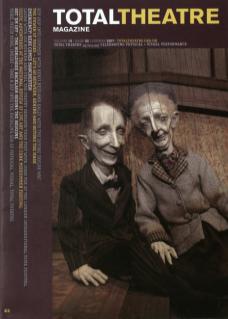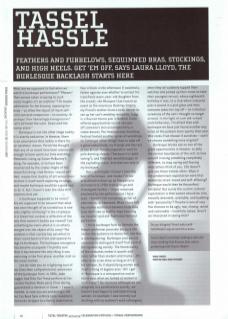What are we supposed to feel when we watch a burlesque performance? 'Phwoor! That woman takes stripping to such erotic heights it's an artform!'? Or maybe admiration for her bravery, exposing her body – so often the object of much self-criticism and comparison to scrutiny. Or perhaps 'How liberatingly transgressive! Let's all break the rules. Down with the nanny state!’
Burlesque is not like other stage nudity: it is overtly seductive. In theatre, there is an assumption that nudity is there for an aesthetic reason. Perish the thought that any of us would have been adolescent enough to have spent our time watching Mnemonic sizing up Simon McBurney's dong, for example, or to have been mesmerised by the sinewy thighs of the beautiful thong-clad Derevo – would we? Well, maybe that duality of art versus basic instinct is itself worth exploring on stage, and maybe burlesque would be a good way to do it. But I haven't seen the show that explores that yet.
Is burlesque supposed to be ironic? Are we supposed to be amused that what was once thought of as scandalous is now only slightly titillating? Is the striptease in a theatrical context a reflection of the way that women's bodies are viewed? Can something be ironic when it is so utterly merged into the object of its irony? The problem is that society has swivelled its chair round back to front and opened its legs to burlesque. The burlesque resurgence has become so popular I'm pretty sure that it has become the very thing it was satirising in the first place: another stall on the meat market.
Let me take you on a lightning tour of my (less than comprehensive) awareness of the burlesque form. In 2006, Jade Jagger had Dita Von Teese perform at her London Fashion Week party (how daring, guaranteed a mention in Closer – I wasn't invited, in case you are wondering); the Art Car Boot Sale in Brick Lane revealed a Victorian stripper to a family audience at four o'clock in the afternoon (I watched a father agonise over whether to extract his transfixed seven-year-old daughter from the crowd); the Whoopee Club hosted an event at the enormous Hackney Empire; my friend's mother hired a belly dancer to sex up her son's wedding reception; a gig in a Russian theme pub in Bethnal Green offered opportunities to eat canapés off someone's skin accompanied by a snake dancer; The International Workshop Festival hosted another series of workshops on (amongst other things) how to take off a glove seductively; my friends and the rest of the British female population went to pole dancing classes (because it's ‘really toning'); and Time Out devoted pages to the exploding scene. And that was only in my backyard.
But – and maybe I haven't seen the best of burlesque, and maybe I'm too prejudiced to dress up as Cleopatra / a dominatrix / a 1930s trollop to go and investigate further – I have remained perplexed by the performances I have seen. I haven't felt turned on, or full of admiration, or liberated. What I have felt has mainly oscillated between body envy (you don't see us muffin-tops twizzling our tassels) and old-fashioned feminist puritanism.
I think burlesque fails to liberate the female performer precisely because she invites the audience to desire her, and this is disempowering. Burlesque uses period costumes to distinguish itself from porn of the lapdancing variety. The theatricality of the costumes makes it quaint and retro rather than modern and mucky – it's okay to do a sex show so long as it's a bit antique.
As if objectifying women was itself a thing of bygone eras: 'Ah! I get it! Burlesque is a retrospective nod at those days when we looked at women in such a way?’ No, because although we are allegedly in a post-feminist society, we haven't even begun to end objectifying women. An example: I was recently out drinking with my partner's work colleagues, when they all suddenly tapped their watches and picked up their coats to take their youngest recruit, whose eighteenth birthday it was, to a club where everyone puts a pound in a pint glass and then someone takes her top off – an initiation ceremony of the sort I thought no longer existed. In the light of such old-school male behaviour, I'm afraid that with burlesque we have just found another way to be on the podium more openly than ever. Who cares if we choose it ourselves – can't we choose something more original?
Burlesque misses out on one of the great opportunities in theatre: to defy the normal boundaries of the self, to lose oneself in being something completely different, to stop caring and fearing what others think of you. Life doesn't give you these tickets often. What if the predominant expectation were that women be strait-laced and self-effacing? Burlesque would then be the perfect antidote! But surely the current cultural expectation is that women should be slim, sexually desirable, available, and bubbling with 'personality'? Theatre is one of very few chances to be ugly, raw, clumsy, weird and vulnerable – truthfully naked. Aren't we interested in seeing that?

